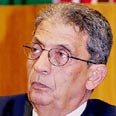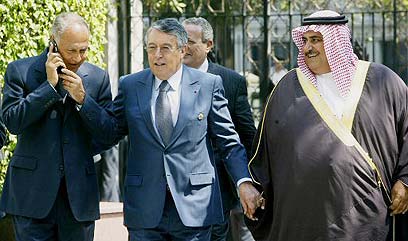
Arab League: Lift closure on Lebanon
Foreign ministers of Arab League call on Security Council to deal with peace process during conference in Cairo: 'We agree peace process failed, we have to get to root of issue through right channels – the UN and Security Council.' Nations also urge UN to pressure Israel into lifting aerial, naval closure on Lebanon
The Arab foreign ministers who assembled for the third time since the beginning of the war in Lebanon, reached a unanimous decision relatively quickly on a variety of subjects they dealt with: Solidarity with and support for Lebanon, assisting Lebanon in its rehabilitation, and supervising the implementation of Security Council resolution 1701, especially on the Israeli violations of the resolution.
The Egyptian-Saudi-Jordanian suggestion agreed on was to call on the Security Council to resume negotiations with Israel based on a different aspect.
"We all agree that the peace process has failed, which is why we have to get to the root of the matter through an appropriate channel – the UN and the Security Council. As a reminder, we have the Arab peace plan, which was approved during the 2003 Arab Summit," announced the League's Secretary General Amro Mussa during a press conference he held following the convention.

Some of the foreign ministers who participated in the convention (Photo: AFP)
Qatar Foreign Minister: Important to be united
This agreement portrays, on the one hand, the will of Egypt, Saudi Arabia and Jordan to minimize the Iranian influence in the region and fear of the intensification of extremist factors such as Hizbullah.
On the other hand, those same countries tend to consent to the effort to minimize the American influence on the process. The United States is then perceived by these countries as supporters of Israel and its policies, such as the democratization of Arab countries.
Qatar's Foreign Minister Sheikh Hamad bin Jassem al-Thani said it is too early to say whether there is an Arab plan concerning the matter.
"First we have to find out what the opinion of the five permanent members of the Security Council is, and if they'll approve the plan. We intend to work with them in order to bring the peace process back on the right path. It is important that our efforts be united."
Before the convention, Lebanese Foreign Minister Fawzi Salloukh criticized Israel on the IDF operation in Lebanon on Saturday and said that "Israel violated yesterday the Security Council resolution number 1701. It will violate the resolution many times in the future, which is why it can't live in peace and keep the peace, the stability and the security in the area."










